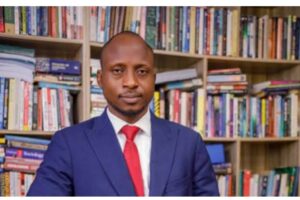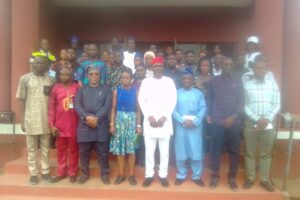
Nairobi — Policymakers, researchers, donors, regional institutions, civil society, and private sector representatives from Africa and Europe are meeting in Nairobi this week for the annual Africa Regional Centres of Excellence (ArcX) Forum.
The conference, which began on Monday under the EU-Africa partnership, is focused on how science, technology, and innovation (STI) can accelerate Africa’s green transition and sustainable development.
It is also pushing for evidence-based policymaking, stronger research collaboration, and knowledge sharing to enhance the management of Africa’s forests, biodiversity, and ecosystems.
“We believe that through science, technology and innovation, we can address the most pressing challenges of our time. We can build stronger connections, foster deeper collaboration, and create lasting impact,” said Ondrej Simek, Deputy Head of the European Union Delegation in Kenya.
Keep up with the latest headlines on WhatsApp | LinkedIn
Speakers at the forum stressed the urgent need for African governments, research institutions, and development partners to adopt an integrated approach to managing the continent’s natural resources–including forests, water bodies, vegetation, and wildlife.
“Africa is losing its forests at an alarming rate. This has severe economic consequences, threatening not only forests but also agriculture, which employs a huge proportion of Africa’s population,” warned Dr. Robert Nasi, Director of Science at CIFOR-ICRAF.
“The result is rising unemployment, desertification, loss of habitats for countless species, declining biodiversity, and damage to the tourism sector–a major contributor to our economies.”
Africa’s ecosystems provide food, clean water, energy, medicines, and jobs, while also protecting communities from the impacts of climate change.
“Africa is rich in potential and natural resources. Yet potential alone is not enough. We must harness science, technology, and innovation to address the pressing challenges of our time: climate change, biodiversity loss, food security, energy access, as well as ocean and coastal management. Science and technology are no longer luxuries; they are essential,” said Dr. Mahaman Bachir Saley, Science & Technology Specialist at the African Union Commission.
Experts highlighted that Africa’s ecosystems are interconnected: forests regulate water cycles, wetlands sustain rivers, healthy vegetation supports wildlife, and pollinators play a critical role in agriculture.
Disruption in one area, they cautioned, destabilizes the entire system.
“Our economies do not depend on a single resource–they rely on all of them working together. If our forests disappear and water resources are lost, then food security, development, and economic growth will all be undermined,” noted Dr. Peter Minang, Africa Director at CIFOR-ICRAF.
“We are already experiencing the impacts of climate change, including prolonged droughts and erratic rainfall. The only way to address these challenges is through collective and sustainable management of our forests, ecosystems, biodiversity, and water resources.”
Agroecology–an approach that applies ecological principles to farming–was highlighted as a vital solution.
By improving soil health, retaining water, and reducing dependence on chemical inputs, practices such as intercropping, agroforestry, and the use of native species can boost food production while restoring biodiversity and strengthening resilience to climate shocks.
“In Africa, where farming is the dominant land use, agroecology can transform agriculture into a driver of both ecosystem health and rural prosperity,” participants noted.
Delegates also underscored the need for credible data and effective monitoring systems to guide evidence-based policymaking.
Without accurate information on species populations, forest cover, land use, and water quality, governments cannot design effective policies or track progress toward commitments such as the Kunming-Montreal Global Biodiversity Framework and the African Union’s Agenda 2063.
“The irony is that we are getting better at monitoring the crisis but remain terribly bad at fixing it. We have satellites, observatories, and advanced monitoring tools–yet action still lags behind. We must move from simply observing to truly acting, because the economic cost of inaction is staggering,” said Dr. Nasi.
Dr. Saley added: “Translating scientific research into political action is critical. Too much of our research remains within universities and fails to reach policymakers. It is time to bridge this gap between knowledge and governance, ensuring that scientific evidence informs decisions for Africa’s future.”
Sign up for free AllAfrica Newsletters
Get the latest in African news delivered straight to your inbox
Success!
Almost finished…
We need to confirm your email address.
To complete the process, please follow the instructions in the email we just sent you.
Error!
There was a problem processing your submission. Please try again later.
The ArcX Forum’s call for coordinated, data-driven, and agroecology-informed approaches comes as African nations strive to balance economic growth with environmental sustainability.
With the right policies and partnerships, experts say, countries can unlock opportunities in green jobs, nature-based solutions, and sustainable land-use practices that deliver long-term benefits for both people and the planet.
Launched in 2023 and funded by the European Union, the Africa Regional Centres of Excellence (ArcX) programme supports collaboration across five priority areas: Agroecology, Biodiversity & Forests, Water, Ocean, and Climate.
Its Biodiversity and Forests component is implemented by CIFOR-ICRAF in partnership with the Regional Centre for Mapping of Resources for Development (RCMRD) in Eastern and Southern Africa, the Central Africa Forest Observatory (OFAC), and the Centre de Suivi Ecologique (CSE) in West Africa.




